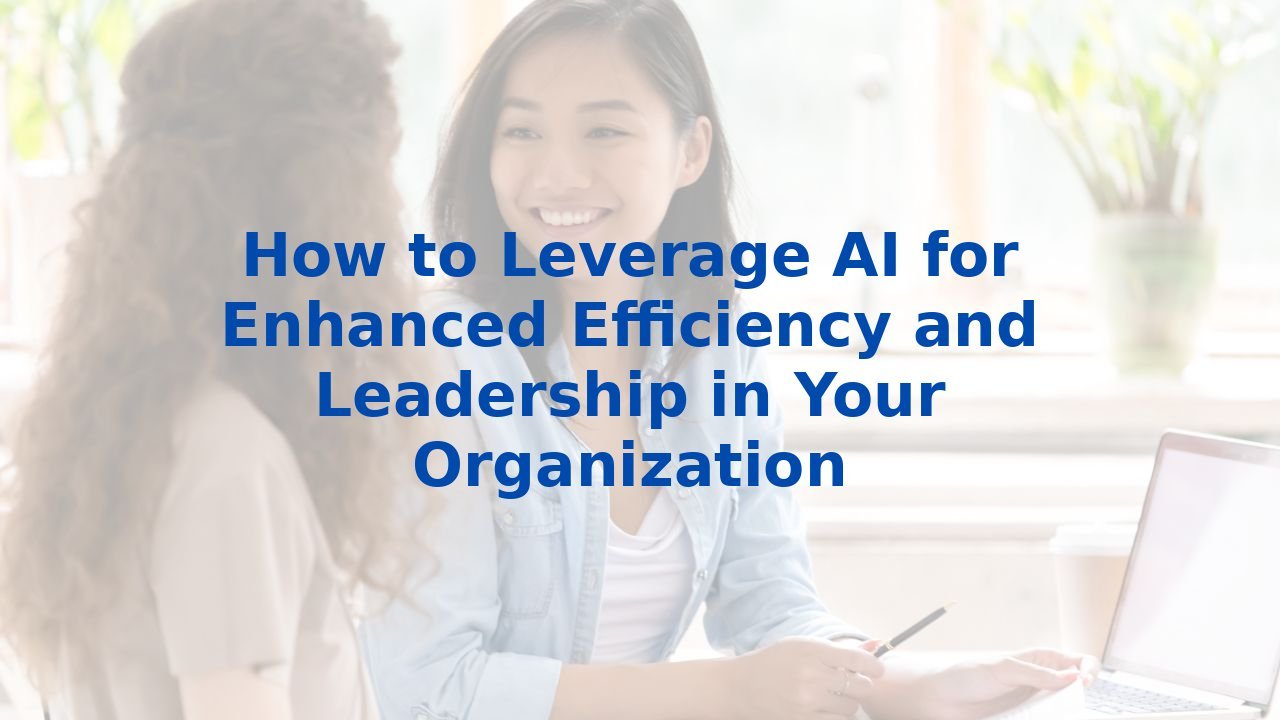How to Leverage AI for Enhanced Efficiency and Leadership in Your Organization
The Future of Business Innovation: How AI Enhances Efficiency and Leadership
Introduction
In an era characterized by rapid change, the ability to innovate and lead effectively is more crucial than ever. Enter Artificial Intelligence (AI)—a game-changing force that is revolutionizing business processes and enhancing organizational efficiency. In this blog post, we'll delve into how organizations can harness the power of AI to streamline operations and elevate leadership capabilities.
The Role of AI in Business Processes
Content Generation and Management
One of the most exciting applications of AI lies in content creation. Tools built on sophisticated algorithms, such as Generative Pre-trained Transformers, can automate the production of various types of content—be it drafting marketing messages or developing training materials. This not only reduces the time spent on writing but also allows for more consistent and tailored messaging that resonates with audiences.
Furthermore, AI can effectively manage content by analyzing employee development goals and recognizing common themes. This helps organizations provide targeted training offerings, fostering a learning culture that benefits everyone involved.
Data Analysis and Decision Making
In an age defined by data, leveraging AI's capabilities in data analysis can be a game-changer. AI technologies allow businesses to cluster free-text data and label it automatically, uncovering trends that would remain hidden otherwise. These data-driven insights enable organizations to make informed decisions that are vital for strategic growth.
For example, imagine predicting equipment failures before they occur. By classifying data and training AI models on these classifications, businesses can stay one step ahead, ensuring smooth operations and minimizing downtime.
Customer Interaction and Support
The interaction between businesses and their customers is undergoing a transformation thanks to AI. Chatbots powered by AI can engage with customers around the clock, answering questions and addressing concerns instantly. This immediate attention not only enhances customer satisfaction but also frees up human agents for more complex inquiries.
Moreover, AI-driven analytics help organizations refine their understanding of customer behavior, leading to more personalized marketing strategies that cater to individual preferences and pain points.
Benefits of AI for Improving Efficiency
Automated Tasks
Embracing AI means introducing automation to the workplace. Repetitive tasks that consume valuable time can be streamlined, allowing employees to focus on strategic initiatives that drive business value. From generating reports to managing meeting schedules, AI alleviates the administrative burden that often overwhelms teams.
Enhanced Decision Making
Data is a formidable asset, but only when harnessed correctly. AI takes large datasets and reveals hidden patterns, assisting organizations in making smarter, more informed decisions. Say goodbye to guesswork and hello to a future where data leads the way in strategic planning.
Improved Customer Experience
A personalized experience is essential in today’s customer-centric world. AI-driven solutions can tailor interactions and offers, ensuring that customers feel understood and valued. This not only builds loyalty but also paves the way for greater customer engagement. For instance, AI-powered tools can resolve complex queries faster than ever, enhancing both response times and overall satisfaction.
The Importance of Training Employees for AI
Adoption and Integration
The success of AI implementation hinges on the readiness of employees to adopt these tools. Providing comprehensive training is essential for effective adoption. By equipping your workforce with the skills to utilize AI, you not only maximize its benefits but also mitigate risks associated with misunderstanding its potential.
Skill Development
As businesses increasingly integrate AI, the need for skilled professionals who can effectively navigate this technology is paramount. Training programs focusing on data analysis, critical thinking, and problem-solving will empower employees to thrive alongside AI, ensuring that they remain valuable assets in an evolving landscape.
Responsible AI Practices
With great power comes great responsibility. Understanding the ethical implications of AI is essential for sustainable growth. Training should encompass essential topics such as responsible AI practices and generative AI policies, fostering a culture that prioritizes ethical considerations alongside business objectives.
Conclusion
AI is not merely a buzzword; it’s a transformative force reshaping the future of work. By enhancing efficiency, informing decision-making, and personalizing customer interactions, AI holds infinite potential for organizations willing to embrace change. However, the successful integration of AI is rooted in a commitment to employee training and education. Only by equipping your workforce with the right tools and knowledge can you harness this potential, driving innovation and positioning your organization for unparalleled success in a competitive landscape.



